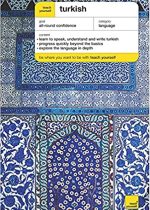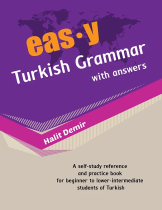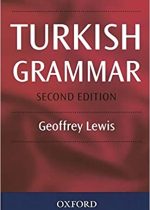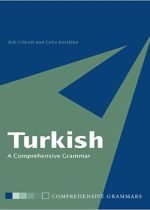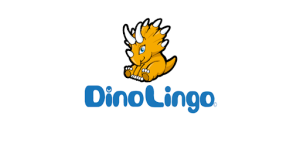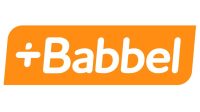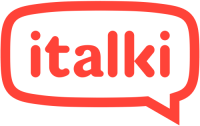Why learn Turkish?
Is Turkish a hard language to learn?
Turkish is a language in the Turkic language family, which makes it linguistically unrelated to Arabic, Persian, and the European languages – the languages spoken by the majority of people who are learning Turkish. Many people have difficulty understanding Turkish grammar because it is a highly agglutinative language. That’s a fancy way of saying that Turkish adds lots of endings onto words, so you can get fatigued half-way through reading long words like gerçekleştirilmiştir. This means that learning Turkish is no joke. In fact, Turkish is often considered one of the hardest languages in the world for English speakers to learn. If you are a native English speaker who picked up another European language like Spanish or German, don’t expect your experience to be the same. You can expect learning Turkish to be entirely different from the languages you already know. But don’t let that discourage you — if babies can learn it, you can too! Let us help you get started.
How can I learn Turkish?
There are many resources available for learning Turkish, and some are more valuable than others. If you are just starting out, it can be hard to figure out where to start. This post will give you a high-level overview of the resources available and the pros and cons of each of them.
Turkish textbooks and grammar books
Good textbooks for beginners
If you’re looking for basic grammar explanations, examples, and exercises, this is a good place to start.
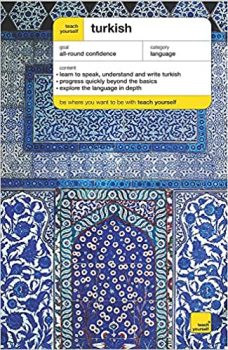
Teach Yourself Turkish
Asuman Çelen Pollard, David Pollard
- Easy to understand for beginners
- Includes exercises to practice what you learn
- There is an audio version, but it is hard to find
- It is not designed to be linguistically precise
When I was learning Turkish, I appreciated reading through Teach Yourself Turkish because the book starts with easy topics for absolute beginners and explains grammar in layman’s terms. It includes example dialogues and exercises and the topics increase from beginner to intermediate topics. By the time I was finished with the book, I had reached basic fluency (B1 or B2 on the CEFR scale).
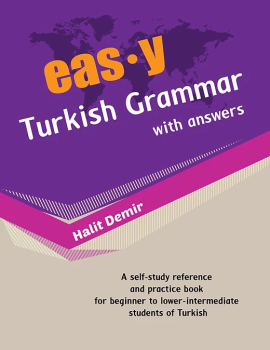
Easy Turkish Grammar
Pros
- Color-coded examples
- Includes exercises
- Online audio companion
Cons
- Contains some difficult linguistic terms
To order, visit easyturkishgrammar.com
Easy Turkish Grammar is a book for either absolute beginners in Turkish or for learners in the novice to intermediate-low levels (A1-B1) who want to revise what they have learned. The book is organized well for English speakers to understand the basic building blocks of Turkish grammar and basic vocabulary. It contains exercises for you to practice what you are learning, and also includes audio recordings that you can access online. There is also a Kindle version that is cheaper than the print book.
A good reference grammar
This is a good choice if you want to be able to look up individual grammar topics along the way.
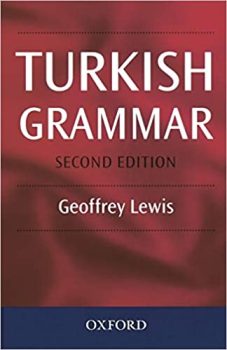
Turkish Grammar
Geoffrey Lewis
- Very accurate information
- Uses precise linguistic terms correctly
- Linguistic terms can be difficult to understand
- Not designed for beginner language learners
If you are already familiar with linguistic terms like accusative and postposition, and you are looking for a reference grammar, this is a good option to consider. This book is not a textbook per-se, since it does not have exercises for practicing and the topics are not ordered from beginner to advanced. Rather, the topics are organized in a way that makes it easy to look up a particular grammar form (all the noun endings are in one section, all the verb endings in another section, etc.) So that makes it a good supplemental resource for when you encounter a difficult grammar form and want to understand it more deeply.
The best book for linguists
If you didn’t get your grammar question answered elsewhere, you’ll find an answer here.
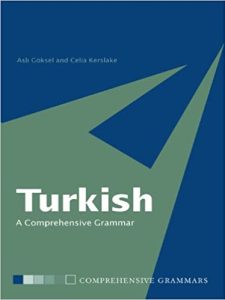
Turkish: A Comprehensive Grammar
Aslı Göksel, Celia Kerslake
Pros
- Covers rare and obscure grammar forms
- Very accurate information
Cons
- Difficult for non-linguists to read
- Not designed for beginner language learners
Order Turkish: A Comprehensive Grammar on Biblio*
Or download the free PDF version on Academia.edu
Anyone seeking to learn Turkish to an advanced level should have a copy of this book, even if it is just to look up obscure topics in the index. As the name suggests, Turkish: A Comprehensive Grammar is by far the most comprehensive work on the Turkish language, covering nearly every grammatical form in the language. It covers non-standard forms used only in spoken Turkish (like gittiydi, “he had gone”). The book also covers advanced grammar forms that you won’t learn from a typical Turkish course or textbook, like the -mış olmak forms and the rare -ası / esi desire tense.
This book was written and edited by linguists, and represents some of the best and latest linguistic research on the Turkish language. I disagree with the position of the book on a few points, such as the explanation of şu (it’s used for directing attention, not for a middle space between bu and o). But still, the book is by far the most accurate Turkish grammar book out there.
Online Turkish Courses
You have probably already heard of some of the big name language learning resources like Rosetta Stone and Duolingo, but before we talk about those programs, take a look at the online courses that were designed specifically for Turkish.
Courses Designed just for Turkish
These courses were custom-made for the Turkish language, so they are not just a copy/paste from a program designed to teach another language like Spanish or English.
Entertaining mix of grammar and culture for all levels of Turkish
For people who are learning Turkish, Turkish Tea Time is a well-known and well-loved resource. The lessons were designed and organized well to suit the Turkish language, and the lessons have entertaining dialogues about topics related to Turkey and Turkish culture. Turkish Tea Time also covers advanced grammar forms that you won’t find in most programs, like -ıyordu and -saydı. It even has a few of the rarer and more obscure forms like -ıp durmak and -ası / esi. So even if you start with a different program, you may want to take another look at Turkish Tea Time after you reach the Intermediate (B1-B2) level.
Pros
- Covers advanced topics
- Engaging and entertaining dialogues
Pricing
- $10 per month
- 5 free lessons available

Grammar course for beginner through intermediate levels
The Fluent in Turkish course combines grammar instruction with audio and video lessons about cultural topics and practical advice for expats living in Turkey.
The goal of the course is to enable people to get enough fluency in Turkish to be able to understand Turkish TV and other media, and to be able to pass Turkish language exams at a B1 level or higher.
FluentinTurkish.com offers self-study lessons online for free as well as live group lessons for different levels.
Pros
- Gives practical advice for expats
- One-time payment instead of subscription
Pricing
- Free online self-study lessons
- $300 for group classes ($10/hour of class)

The Turkish4 courses include three courses: one for children (with a reading and non-reading option), one for teens, and one for adults. The Turkish4 Children course comes in three modules.
Turkish4 is a sub-brand of London-based LinguaVoca, but their courses are not like the mass-produced, one-size-fits-all approach that most companies take when they attempt to teach multiple languages. While I haven’t been able to confirm this for certain, it appears from their website and free video content that the lessons are all original Turkish content, so there are no awkward translations from English. It also appears to be a complete immersion experience in Turkish, so there aren’t explanations of grammar topics in English.
Turkish4 also occasionally offers live workshops online. Check their Facebook page for availability and pricing.
Pros
- Full immersion in Turkish
- No translation from English
- Separate courses designed for children, teens and adults
Pricing
- Get in touch with Turkish4 via their website or Facebook page for availability and pricing
- Some videos available for free on their YouTube channel
Free Online Turkish Lessons
If your budget is approximately zero dollars, this is the only course that will get you to basic conversational fluency.

You’ve probably heard of Duolingo, since it is the most popular free service for learning languages online. Duolingo is designed for users to get users from beginner to the early stages of intermediate (B1). That’s not very far in Turkish, but if you are looking for an absolutely free resource that can get you started in Turkish, this might be your best bet. There is a paid version that removes ads and gives some extra features, but the basic program is available for free.
Pros
- It’s free.
Warning: Translation from English
Duolingo primarily uses translation to teach Turkish. That means that with Duolingo you will learn Turkish by translating words and sentences from English to Turkish and from Turkish to English. This is a very inefficient way to learn a language, and can be especially problematic when translating between languages in completely different language families like English and Turkish. One example of this is the translation of the Turkish -dır ending. It has been observed that Duolingo incorrectly treats -dır as essentially the same as the third-person copula “is” verb in English.
Full Immersion Turkish Programs
These programs allow you to be fully immersed in Turkish, so you can learn the language without using English to talk about the grammar.

This is a pretty useful tool for people who can afford it. The main benefit of Rosetta Stone is that it offers a full immersion style of instruction, which means there is only Turkish with no English explanations. This is a much more natural way of learning, especially for gaining vocabulary and improving pronunciation.
Pros
- Full immersion
- Good quality apps available for all devices
- Good for learning vocabulary and pronunciation
- Useful for children as well as adults

Warning: Translated content in Rosetta Stone
However, since Rosetta Stone’s content was translated from English, there are some oddities in some of the lessons. The most obvious of these issues is the fact that Rosetta Stone teaches the word ihtiyaç and makes it sound like it is the normal word in Turkish for any kind of need. This is not true, however, and it leads Turkish learners to use the word ihtiyaç in many places where they should be using one of the more common forms using words like lazım or gerek.
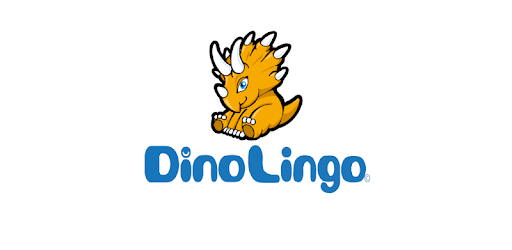
DinoLingo Turkish uses a mashup of animations, songs and short stories to teach kids basic vocabulary (around 200 words). It is a full immersion experience that is very kid-friendly. It stays fairly basic and does not seek to teach much in the way of grammar, but can be a good starter program, especially for young children.
Pros
- Full immersion
- Apps available that children can use
- Good for learning vocabulary and pronunciation
- Useful for very young children through elementary school
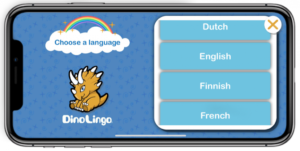
Other decent subscription-based programs
These courses are similar to the ones designed for Turkish but with the downside that the system wasn’t designed specifically for Turkish.

by InnovativeLanguage.com
TurkishClass101.com* offers audio, video and text-based lessons to help you get from beginner (A1) level to intermediate (B1-B2). Once you have reached conversational fluency (B2-C2), the lessons switch from teaching grammar concepts to having an audio dialogue about a topic related to Turkish culture or the country of Turkey. One nice thing about TurkishClass101.com compared to Duolingo or Busuu is that the content of the lessons appears to all be in original Turkish, not translated from English. The free Word of the Day* feature, on the other hand, includes phrases that were translated from English to Turkish, so that is not as useful for people who want to learn natural-sounding Turkish.
Pros
- Topics related to Turkey and Turkish culture
- Lesson content is original Turkish, not translated from English
Extras with the Premium Plus Plan
- 1-on-1 access to a Turkish teacher
- Language assessments and certificates of proficiency (according to the CEFR scale)
- Personalized feedback, homework assignments and study plan
- Pronunciation and accent help
Pricing
- Subscription plans* ranging from $4 to $23 with a 24-month commitment (with a 60 day money-back guarantee). If you pay for less than 24 months at a time, the cost per month goes up slightly.
- 7-day free trial* of the Premium plan

Busuu is another subscription-based online program for Learning Turkish. Unlike many programs, most of Busuu’s lessons are available in the free version, with only a few key lessons and certain features like quizzes that require a paid subscription.
Pros
- Lots of free content
- You can practice with a native speaker (paid plans only)
Pricing
- Premium plan ranges from about $5 – $10 per month depending on the subscription length that you commit to
- The Premium Plus plan ranges from about $6 – $14, and gives you extra features like a personalized study plan.
- 14-day money back guarantee
Warning: Translated Content
One thing you should know about Busuu, however, is that a lot of the content of the lessons appears to be sentences and phrases that were translated from English to Turkish. Whenever you do translation, the result is never quite as natural of a sentence as you would find in a native’s speech. So you may end up learning some things that don’t sound quite right. An example of this can be found in lesson 10. One of the example sentences in that lesson is Ben İngilizce konuşurum (I speak English). The more natural way to say this in Turkish would be İngilizce konuşuyorum or İngilizce biliyorum.
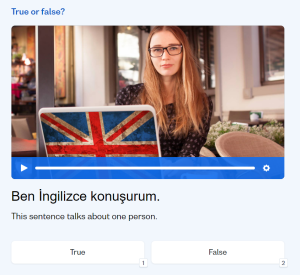
Turkish programs that are not worth your money
These programs were designed for learning other languages, but the Turkish version is not great. You won’t find much in these programs that isn’t available for free on Duolingo.
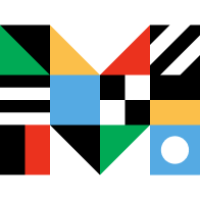
Mango Languages
Not many topics for a paid service
The Turkish course on Mango Languages does not cover very much content compared to other programs out there (only 68 lessons). So for a service that requires a monthly subscription, it’s probably not worth it unless you already have access through your institution. Besides, the lessons are read by a text-to-speech robot voice, which I personally find annoying.
Positive side: cultural explanations
One positive thing that sets Mango Languages apart from other Turkish courses, however, is that they include cultural explanations alongside related language topics. One example of this is in their first lesson on greetings, where they give some background on the Arabic loan word merhaba and explain that people in Turkey often greet each other with a kiss on the cheek.
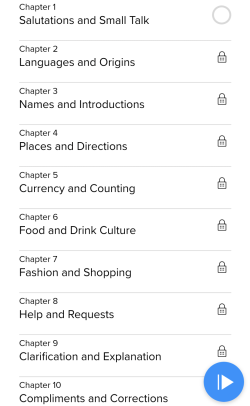
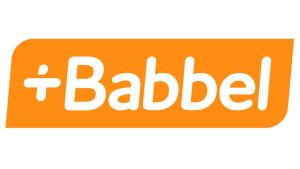
Not many topics for a paid service
While Babbel is a popular option for learning some languages, their Turkish course is not very extensive, and most of the lessons require a paid membership, unlike Duolingo. Still, it may be worth taking a look at the free lessons available. The first lesson in each course is offered for free, and Babbel offers a 20-day money back guarantee.
Translated content
Sometimes Babbel requires you to translate between English and Turkish when learning vocabulary. This is innocent enough when you are translating the most basic words like hello and please, but it is still not the fastest way to learn vocabulary.
Fill-in-the blank grammar
In later lessons where you learn more complicated grammar, the teaching style is similar to standard classroom-style language learning, involving lots of fill-in-the blank and matching verb conjugations to the correct sentences.
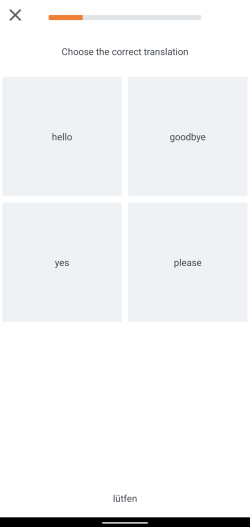

Bad translations from English to Turkish
As far as I could tell from looking at the free lessons available for Mondly’s Turkish program, all the content is translated from English to Turkish, and even some of the grammar explanations are just bad translations of simple sentences from English to Turkish. For example, in one of the early screens, it tells you to translate the sentence, What is your name?. If you click on the English word is, it shows you a table that is supposed to help you translate the verb to be into Turkish. As you can see in the screenshot, the translations are not helpful. They give sentences like Ben var olurum, which would almost never be uttered by a native Turkish speaker. (if they did say it, it would mean something like I would be willing to exist). So unless you are really confident in your ability to detect incorrect translations like this, using Mondly to learn Turkish is probably more harmful than helpful.
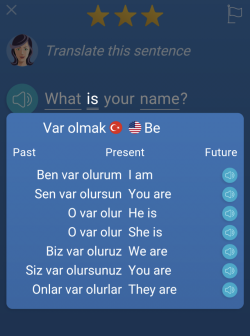
PRO TIP
If you try to translate all your grammar from English to Turkish, it will not work out well for you.
Learn Turkish with a private tutor
For most people, the best way to learn Turkish is through private, one-on-one lessons with a native Turkish speaker. If you live in Turkey, you could try hiring someone you know or ask around for native speakers who can meet with you in person. Or, choose from hundreds of native speakers on preply and italki.
Preply has over 100 native Turkish speakers who can give personalized 1-on-1 language lessons. With Preply, you can book trial lessons with tutors with confidence because you can receive a full refund of the first lesson’s price or a replacement lesson with a different tutor if you were not satisfied with the trial lesson.
Visit Preply.com to book your first lesson*
Visit italki.com to book your first lesson*
Free video lessons on YouTube
If you are looking for ways to learn Turkish for free, you can take advantage of the many free resources available on YouTube for learning Turkish. Below are a few of the more popular resources on YouTube for learning Turkish.
YouTube Playlist by Yunus Emre Enstititüsü
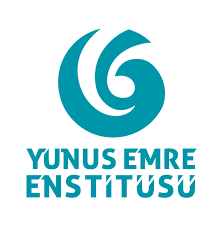
The Yunus Emre Institute has a playlist of video lessons from their Turkish course. One benefit of this resource is that the videos are ordered from easier to harder topics.
-ıp and -mayıp endings
Example Video from Yunus Emre Enstitüsü
Ali Yılmaz's YouTube Channel
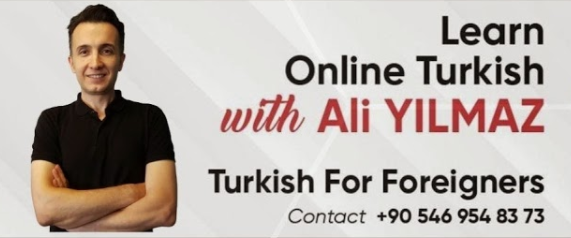
Ali Yılmaz has hundreds of videos on his YouTube channel designed for foreigners learning Turkish. Some of his videos explain specific grammar concepts (like the example video below). Other videos have short stories or explanations of specific Turkish words or idioms.
Example Video from Ali Yılmaz
-lı and -sız endings
Murat Hoca's YouTube Channel

Murat Hoca’s YouTube Channel has a few dozen videos where he explains Turkish grammar concepts in way that is similar to the classroom teaching style of TÖMER. The exam prep videos may be particularly helpful for someone studying in preparation for a TÖMER exam.
Example Video from Murat Hoca
A1 Exam Prep
Is there something we missed?
If you know of other resources that are worth sharing, please tell us about it in the comments section below.
*Commissioned link. (Learn more)

